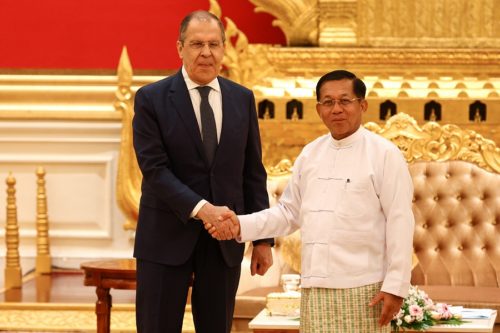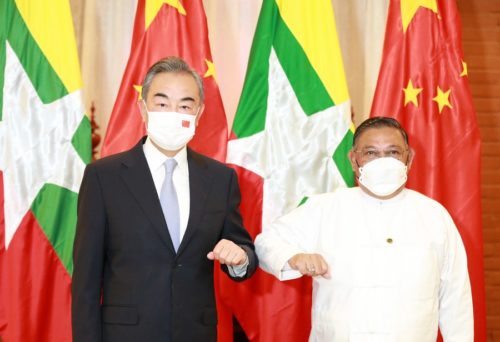Beijing ‘deeply concerned’ for safety of Chinese in Myanmar after factories set ablaze
In the most violent day in Myanmar since the military coup d’état six weeks ago, dozens were killed and Chinese factories were attacked in the suburbs of Yangon on Sunday. Beijing walked a fine line in its response.

Protests in Myanmar, and the military junta response to them, escalated over the weekend, leaving at least 38 dead on Sunday alone, per the Wall Street Journal. Six townships of Yangon, the largest city in the country, are now under martial law.
Dozens of Chinese companies were attacked, in what the WSJ noted were “the first time foreign businesses have been directly caught up in the violence.”
- Thirty-two factories were vandalized, the Chinese embassy in Myanmar told the Global Times (in Chinese), totaling about 240 million yuan ($37 million) in damages.
- Two garment factories were “destroyed in arson attacks,” according to other reports, and two Chinese employees were reportedly injured.
It’s not clear how the attacks began but the Chinese embassy released a statement (in Chinese) saying they were “completely nasty” (十分恶劣), and the Chinese Foreign Ministry chided protesters (English, Chinese) to “voice their appeal in a lawful manner.”
- Foreign Ministry spokesperson Zhào Lìjiān 赵立坚 declined to confirm whether China was considering evacuating its citizens in Myanmar, though he added that Beijing was “deeply concerned” for their safety.
- Zhao said:
China hopes that the relevant parties in Myanmar will keep calm and exercise restraint, act in the fundamental interests of the people, address their differences through dialogue and consultation within the constitutional and legal framework, and continue to advance the democratic transition. The immediate priority is to prevent further conflict and bloodshed, deescalate the situation and bring down the temperature as soon as possible.
On the vandalizing, looting and arson attacks on Chinese companies in Myanmar, the incident was egregious. Upon learning of it, the Chinese embassy in Myanmar immediately contacted the China Enterprises Chamber of Commerce in Myanmar (CECCM) and relevant companies and promptly asked local police to take strong measures to protect the safety of Chinese businesses and employees. The Myanmar side has sent additional police, fire and rescue forces to the region to maintain order and deal with the situation on the ground. China will continue to urge Myanmar to take practical measures to stop all violent behaviors and hold the culprits accountable, and ensure the safety of life and property of Chinese businesses and personnel in Myanmar.
Can Beijing continue to stay neutral?
In the six weeks since the military coup d’état in Myanmar, Beijing has remained more cautious than most large countries in its response.
- As Brian Wong reported for The China Project last month, Beijing initially cast what it dubbed a “new cabinet reshuffle” in Myanmar as a domestic issue.
- At the same time, it is “unlikely that Beijing welcomes” the coup, Wong wrote, largely because China-Myanmar relations under the ruling National League for Democracy (NLD) had been steadily deepening, even if popular opinion of China remained skeptical in the country.
- Protesters in Myanmar continue to suspect that China supports, even if tacitly, the military takeover, since it has not explicitly condemned the coup.
- As recently as a week ago, Chinese Foreign Minister Wáng Yì 王毅 reiterated that Beijing would seek a neutral policy on Myanmar, even as it “agreed to a United Nations Security Council statement that called for the release of elected leader Aung San Suu Kyi and other detainees,” per Reuters.
What could come next: If more Chinese assets get attacked (as some protesters have threatened), will Beijing continue to try to take a neutral line? Or might Beijing choose to condemn the protests themselves, and throw its support behind a more forceful crackdown?






